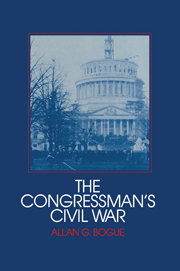Book contents
- Frontmatter
- Contents
- Acknowledgments
- Introduction
- 1 The paths of power: congressional career lines and the coming of war
- 2 Lincoln and the “disorderly schoolboys”: a chapter in executive–legislative relations
- 3 An “inquiring disposition”: the investigative process in the House of Representatives
- 4 “God alone can guide us”: authority structures in the House of Representatives
- 5 Conclusion
- Appendix: Representatives and senators who died in office, 1844–1865
- Notes
- Sources cited
- Index
- Frontmatter
- Contents
- Acknowledgments
- Introduction
- 1 The paths of power: congressional career lines and the coming of war
- 2 Lincoln and the “disorderly schoolboys”: a chapter in executive–legislative relations
- 3 An “inquiring disposition”: the investigative process in the House of Representatives
- 4 “God alone can guide us”: authority structures in the House of Representatives
- 5 Conclusion
- Appendix: Representatives and senators who died in office, 1844–1865
- Notes
- Sources cited
- Index
Summary
When the Civil War broke out, the federal representatives and senators had been making their annual pilgrimages from their states to the nation's capital for seventy years. They had traveled in fair weather and foul, on horseback and by stagecoach, coastal vessel, canal boat, and river steamer, and finally on the cars of the wonder of its age, the railroad. Usually in December of each year they settled into the boarding messes, hotels, and private homes of the capital city and set themselves to the tasks of national governance. Sometimes their labors brought them little but tedium, enlivened perhaps by the occasional clash of personalities, but on occasion the lawmakers faced grim crises when their decisions defined the realities and meaning of the American Republic. Through time, these men shaped the ways in which the Congress of the United States did business and were themselves shaped to some degree by the experience. But through those seventy years none of the people's representatives faced a more fateful task or future than those who filled the legislative chambers of the Capitol during the Civil War. Yet their concerns, their perspectives, their individual objectives, and their collective labors are still too little known to us. This little collection of essays is an attempt to reconnoiter some of the possibilities for understanding the congressmen, their relations with one another, and their interaction with Lincoln, through an understanding of Congress as an institution.
- Type
- Chapter
- Information
- The Congressman's Civil War , pp. 142 - 148Publisher: Cambridge University PressPrint publication year: 1989

